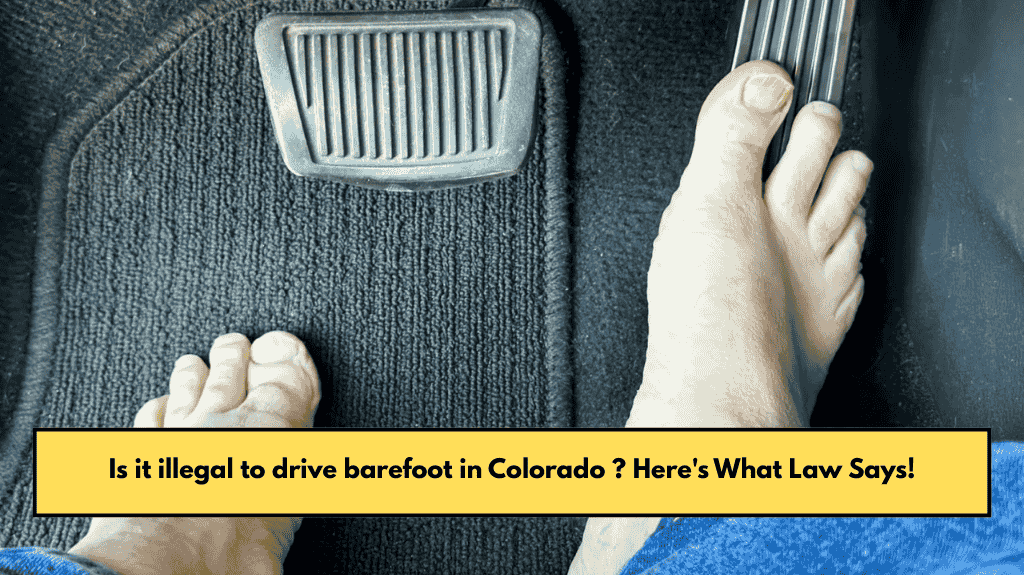Driving barefoot in Colorado is not illegal. There are no state laws that prohibit operating a motor vehicle without shoes, and this is a common misconception that persists despite being debunked by legal experts and state authorities. In fact, it is legal to drive barefoot in all 50 states, including Colorado. This means you cannot be ticketed or fined solely for choosing to drive without footwear.
What Colorado Law Actually Says
- No Explicit Ban: Colorado has no statute or regulation that requires drivers to wear shoes while driving. You are free to drive barefoot, in socks, or in any type of footwear you choose.
- Urban Legend: The belief that driving barefoot is illegal is an urban legend, often perpetuated by parents or driving instructors for safety reasons, not legal ones.
Safety Considerations
While driving barefoot is legal, it is not always recommended. Safety experts and some state agencies caution that driving without proper footwear can present risks:
- Reduced Pedal Control: Bare feet may slip off the pedals more easily, especially if they are wet or sweaty, potentially leading to loss of control.
- Injury Risk: In the event of an accident, bare feet are more vulnerable to injury from pedal edges, debris, or forceful impact.
- Temperature Extremes: Colorado’s cold winters and hot summers can make pedal surfaces uncomfortable or even painful to touch with bare feet, which could distract you while driving.
- Footwear Alternatives: Some types of shoes—such as flip-flops, high heels, or bulky boots—can also impair pedal control or get stuck, sometimes making barefoot driving a safer option than wearing unsafe footwear.
Insurance and Accident Claims
- Insurance Coverage: Driving barefoot does not automatically void your insurance or make you ineligible for coverage after an accident.
- Contributing Factor: If you are involved in an accident and it is determined that being barefoot contributed to the crash (for example, your foot slipped off the pedal), this could be noted in the police report. Insurance adjusters may consider this when determining fault or liability, potentially impacting your claim.
- Legal Responsibility: If driving barefoot is deemed to have impaired your control of the vehicle and contributed to an accident, you could face additional scrutiny or be found partially at fault.
Common Myths Debunked
| Myth | Reality |
|---|---|
| Driving barefoot is illegal | Not true in Colorado or any U.S. state |
| You’ll get a ticket for being barefoot | Only if you are driving unsafely, not for being barefoot itself |
| Insurance won’t cover barefoot drivers | Not true; coverage depends on policy and circumstances, not footwear |
Recommendations for Drivers
- If you prefer to drive barefoot for comfort or control, it is legal, but be aware of the potential risks.
- Consider keeping a pair of secure, closed-toe shoes in your vehicle for situations where better foot protection or pedal control is needed.
- Always prioritize safety and ensure you can operate the pedals confidently, whether barefoot or shod.
Driving barefoot in Colorado is legal, but it is not always the safest choice. The law does not require footwear, but if an accident occurs and being barefoot is found to have contributed, it could affect how fault is determined. For optimal safety and to avoid complications in the event of an accident, most experts recommend wearing secure, non-slip shoes while driving.
Sources:
- https://personalinjuryco.com/can-you-drive-barefoot-in-colorado/
- https://rothgrouplaw.com/2024/11/21/is-it-illegal-to-drive-barefoot-and-could-it-impact-an-accident-claim/
- https://1800lionlaw.com/is-it-illegal-to-drive-barefoot/
- https://www.thezebra.com/resources/driving/driving-barefoot/
- https://www.drivesafeonline.org/traffic-school/legal-drive-barefoot/













